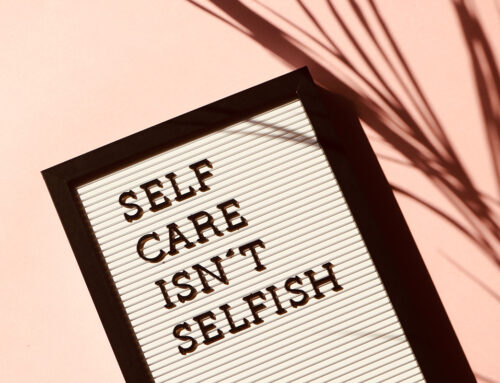Too often, we put taking care of ourselves on the back-burner and focus on the needs of others. Ever notice how taking care of others means you’re generous, helpful, giving, thoughtful…but doing something for yourself is labeled selfish?
Here’s the thing – self care isn’t selfish.
Self care is essential for our physical, emotional and mental well-being. However, unlike other tasks that may come naturally, self-care needs to be deliberate, intentional, and self-initiated.
Since the early 1960s, doctors have been discussing self-care as a way for patients to take care of themselves in the medical field. Patients were encouraged to increase healthy habits such as good nutrition and exercise in an effort to increase autonomy and reduce high blood pressure, high cholesterol, and obesity. More recently, self-care has been championed as an approach to not only reduce illness, but rather, increase wellness and reduce stress. Self-care has been known to reduce stress levels and increase short-term and long-term health and well-being. Therefore, self-care isn’t self-indulgent, it is necessary for health and living.
More than likely, your idea of self-care is associated with the mantra of “treat yo self,” but this implies that self-care is a “treat,” and not everyday.
Self-care is so much more than a materialistic way to care for yourself. In fact, it can be broken down into six different steps:
Personal self-care assists in increasing feelings of self-confidence through goal setting and learning more about yourself. Without knowing who you are, it is hard to grow in other areas
Physical self-care focuses on your basic physical needs and helps keep you healthy, happy, and refreshed
Emotional self-care gets you in touch with your feelings and can help boost your self-worth and help avoid feeling overwhelmed or burdened with emotions you experience.
Psychological (intellectual) self-care activities help you develop a clear head and develop a positive mindset and healthy coping skills
Spiritual self-care such as finding purpose in your life can foster gratitude and inner peace in your life
Professional (practical) self-care such as establishing professional work boundaries ensure that you stay smart, healthy, and motivated
Each of these areas deserve your attention. Self-care shouldn’t be reserved for times when you’re completely exhausted and need to take a break from the chaos. Self-care should be part of your normal, everyday, routine. Sometimes that means putting off laundry for another day, and sometimes that means focusing on your feelings. Self-care is about living a life that feels good as opposed to one that simply looks good.
Ultimately, in order to practice self-care, you need to make purposeful choices in your life that put you first. Just like on a plane, you need to put your own oxygen mask on first before helping others. True self-care is not about ordering takeout, splurging on new clothes, or taking a bubble bath. True self-care is about making choices in your life that enhance your health and well-being. It’s about meeting your own needs; it’s about self-preservation. How can that be selfish?
If you find yourself struggling to establish time for self-care into your regular schedule, be sure to read our next blog post for ways to incorporate self-care routines into your daily life.





